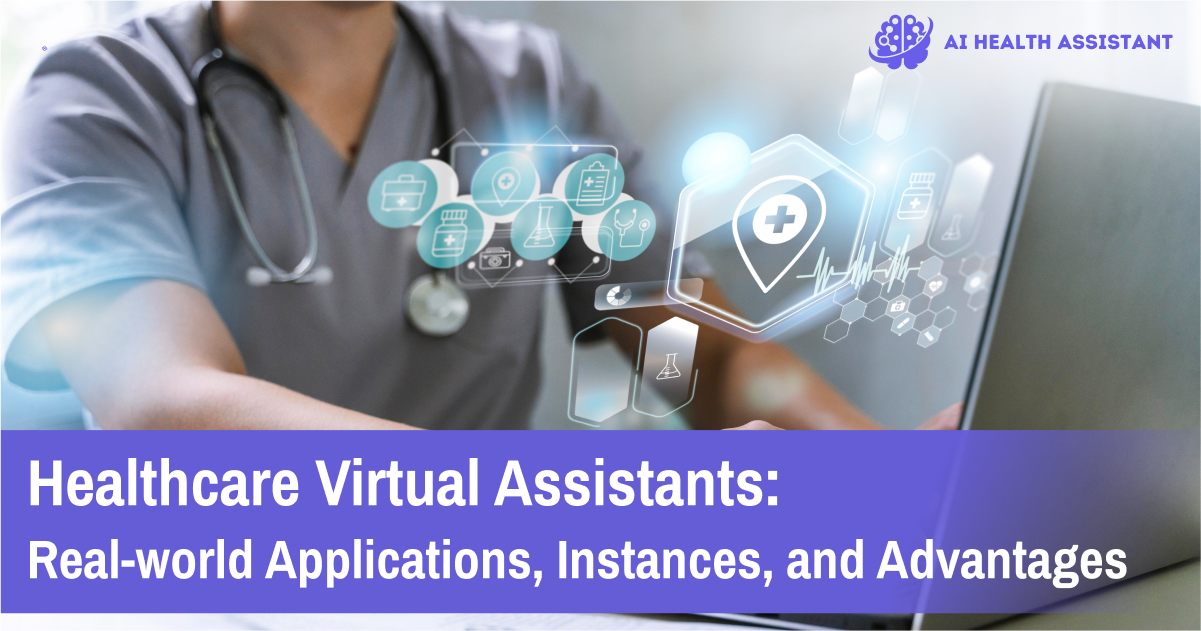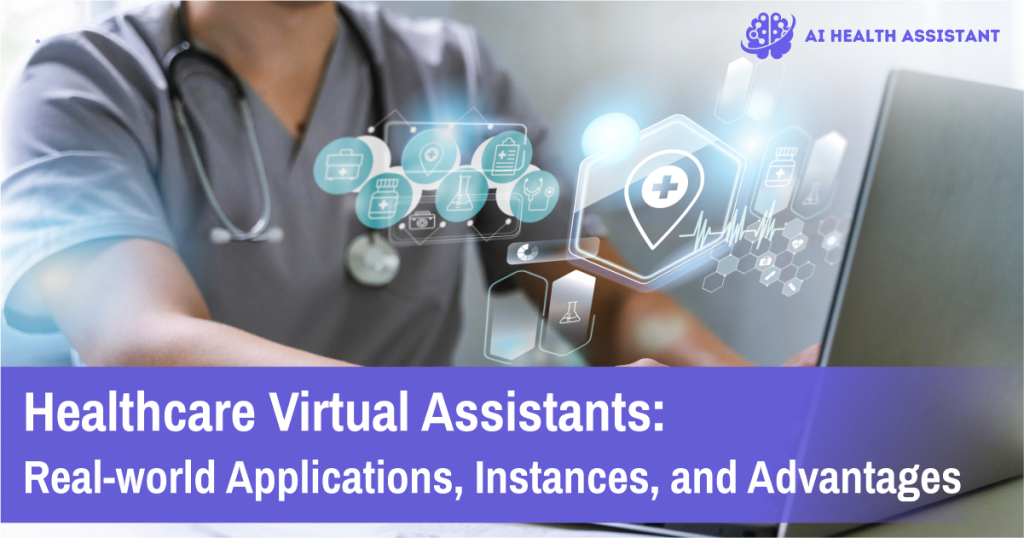
Healthcare Virtual Assistants: Real-world Applications, Instances, and Advantages
Healthcare Virtual Assistants (HVAs) represent an incredible milestone in healthcare technology’s evolution. Thanks to artificial intelligence (AI), HVAs are becoming ever more sophisticated – offering more applications beyond basic patient interactions. AI chatbots for healthcare make interactions between physicians and patients simpler while improving efficiency across care delivery networks. We will explore how virtual healthcare assistants are used for patient engagement, health data analysis, telehealth support services, etc.
Imagine having medical support available around the clock, right at your fingertips. Now it is possible with AI virtual assistants, to provide personalized and efficient services. AI solutions for healthcare are expected to continue expanding at an astounding rate, revolutionizing both patient care and administrative tasks.
HVAs can make a tangible and impactful difference for healthcare organizations – from streamlining appointment scheduling to improving telehealth services. Their benefits are numerous and include increased efficiency, decreased workload for healthcare professionals, and enhanced patient experiences.
As well as exploring how AI healthcare companies are shaping the future of medicine with innovative generative AI healthcare solutions, such as appointment reminders and round-the-clock patient support services, AI is revolutionizing healthcare for everyone involved – so let’s quickly read all about it without further delays!
Understanding Virtual Assistants in Healthcare
Healthcare chatbots are user-friendly tools that combine artificial intelligence (AI) in healthcare with medical expertise to enhance patient care and administrative tasks. In essence, these chatbots serve as virtual medical assistants interacting directly with users either via text messaging or voice calls; through machine learning and natural language processing technologies, these bots understand and respond efficiently to patient inquiries.
Virtual healthcare assistants play an invaluable role in connecting patients to healthcare providers. Acting as digital helpers that are always on call, these virtual healthcare assistants handle tasks such as answering health-related queries from users; scheduling appointments; medication reminders; providing health advice; offering health advice, answering health inquiries from users as well as answering inquiries directly. Their accessibility not only increases patient engagement but also frees healthcare staff up from tedious administrative duties that take away time they could use to provide critical care services instead.
Integration of chatbots into electronic health records (EHRs) has proved groundbreaking, providing easy patient data access. This has allowed physicians and nurses to offer more individualized care by having immediate access to patient histories and preferences.
After pandemics, virtual healthcare solutions like artificial intelligence healthcare solutions have seen an exponential surge in virtual healthcare environments – from solutions for healthcare to generative AI applications in healthcare environments – with patients being able to easily access services online via these platforms. AI applications in healthcare are also growing significantly within digital environments with chatbots providing many of the same services that would typically require in-person visits!

What Are The Various Advantages Of AI Solutions In Healthcare?
Chatbots powered by artificial intelligence are revolutionizing healthcare services. Here are their key advantages:
Enhance Patient Engagement: Healthcare chatbots equipped with AI are revolutionizing how patients engage with healthcare services, offering tailored communications tailored to individual needs and increasing active participation in health management by making patients feel more engaged with and understood throughout their healthcare journey.
24/7 Access: Chatbots offer 24/7 accessibility in an industry prone to emergency situations. Offering instant responses and guidance even outside business hours, chatbots help patients quickly obtain answers for urgent health queries or guidance when seeking emergency medical treatment, thus decreasing hospital visits while alleviating healthcare system pressures.
Appointment Scheduling: Chatbots have made healthcare appointments much simpler for patients. Users can quickly book, reschedule and cancel appointments through an interactive interface – reducing administrative workload for healthcare workers while improving management through reduced no-show rates and creating an efficient healthcare delivery system.
Cost Savings: Chatbots provide significant cost savings in healthcare by automating routine inquiries and interactions, relieving staff workload, and freeing healthcare professionals up to focus on more complex tasks while decreasing unnecessary in-person consultations thereby saving resources.
Health Education: Healthcare chatbots play an essential part in patient education. By offering tailored and easily digestible information about diseases, treatments, and preventive care – such as diseases and treatments – chatbots allow patients to make more informed health decisions that foster an environment of preventive health management and proactive health management. Let’s collaborate! Let’s build it.
Medication Management: One of the main challenges in healthcare is medication- adherence; AI chatbots in the healthcare sector can be invaluable in this regard. This in turn helps ensure patients take their prescribed drugs on schedule by sending timely reminders and tracking schedules. This approach can especially prove useful when managing chronic diseases as regular compliance is key to effective care.
Telehealth Support: Chatbots have become an indispensable element of telehealth services, offering first health evaluations and responding to frequently asked medical queries while also enabling remote consultations for people living in remote or underdeveloped areas who might otherwise find it hard to access traditional health services. Yes, we do. Patients in such locations will especially appreciate this help from us.
Scalability: One major benefit of healthcare chatbots is their scalability. They allow healthcare providers to manage multiple interactions simultaneously while still providing quick assistance for each patient – especially important during medical emergencies or busy times, helping ensure high-quality care is still provided despite challenging circumstances. Allows for continuity.
Real-World Use Cases Of AI in Healthcare
Artificial Intelligence (AI) in healthcare has completely transformed the industry. Here are five AI applications that are revolutionizing patient care and operations management:
Artificial Intelligence in Healthcare for Disease Diagnosis and Prediction: Artificial intelligence has quickly become a staple of healthcare, helping healthcare providers accurately and early diagnose cancer, diabetes, and cardiovascular conditions more accurately than traditional methods; AI algorithms may analyze complex medical data such as imaging scans or genetic information to quickly and accurately detect such conditions as cancer, diabetes or cardiovascular issues more rapidly and precisely than ever. AI may even simultaneously analyze thousands of mammograms simultaneously to detect early signs of breast cancer so timely treatment options may be identified and available to them.
Customized Treatment Plans: Artificial intelligence has the power to create tailored treatment plans specifically tailored for each individual patient, taking into account medical history, lifestyle habits, and genetic makeup data analysis. AI systems then generate tailored recommendations – not only increasing effectiveness but reducing adverse side effects associated with medication regimens – such as oncology practitioners using AI when selecting drug combinations based solely on genetic makeup.
Robotic Surgery and Assistance: Artificial intelligence-powered robotic systems have revolutionized surgical procedures which offer greater precision and faster recovery. Surgeons often utilize these robots during complex procedures for stability and accuracy while others perform certain tasks autonomously with supervision from surgeons – all while drastically decreasing human error, making these systems particularly suitable for minimally invasive surgeries.
Virtual Health Assistants: Artificial intelligence-powered virtual assistants and chatbots have revolutionized patient engagement and support by offering 24/7 help with answering health-related queries, reminding of medications, scheduling appointments, and answering inquiries regarding them – especially useful when managing chronic illnesses or providing mental health support.
Drug Development: Artificial Intelligence is transforming drug discovery and development processes, saving both time and resources. AI technology quickly scans vast chemical databases for potential new medicines to treat patients faster – instead of waiting years until new treatments become accessible through traditional means.
Conclusion
Artificial Intelligence in healthcare, particularly through AI Health Assistants, is revolutionizing the industry. These AI solutions offer everything from personalized medical advice and appointment scheduling support to precise diagnostic support and more. AI Health Assistant platform represents this evolution by offering easy healthcare consultations and streamlining complex medical interactions. Adherence to privacy standards, HIPAA compliance, and stringent security measures guarantee the safe handling of sensitive health data. AI Health Assistant platforms have emerged to increase efficiency while simultaneously expanding access to medical knowledge and support, marking a step toward a more inclusive, efficient healthcare system that fulfills modern medicine’s broader goals.